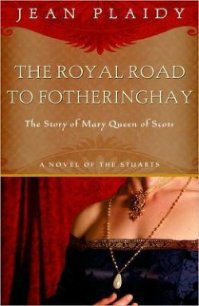Queen of This Realm - Plaidy Jean (читать бесплатно книги без сокращений .txt) 📗
Once I met Thomas Seymour at Blandel's Bridge, which was also known as Bloody Bridge because it was the haunt of robbers who thought nothing of slitting a traveler's throat for the sake of his purse.
Thomas bowed low and gave me such a look that there could be no doubt of his feelings for me. I asked him if he was on his way to the Dormer Palace and he said that he was but since he had met me in the fields, might he be permitted to ride with me?
I knew this would be dangerous and if we were seen, which we almost certainly would be, it would give rise to gossip, and what if that reached the ears of the Council? So I haughtily refused permission. He bowed his head in submission and I whipped up my horse. I had thought he would pursue me. Surely that was what one would expect of a reckless admiral. But when I looked round he had disappeared.
I was tingling with excitement.
It was a few days later when my stepmother and I were seated over our needlework and she dismissed all her attendants so that we were alone together. She began to talk to me about her life in a strange sort of way, telling me things which I knew already.
“I am not an old woman,” she said, “and until now I feel that I have never been young. I was little more than a child when I was given in marriage to Lord Borough of Gainsborough. He seemed very old to me. His children were older than I. I was his nurse until he died. You would think, would you not, that I would have been allowed a free choice. But I was given to Lord Latimer. He, too, was elderly, and I was a wife and stepmother all at once. It seemed to be my fate… until now. I suppose I seem old to you, Elizabeth. You are so young. Imagine, not yet fourteen years old! Oh, I think back to the days when I was fourteen. I had my dreams. And then my first marriage. I was terrified, Elizabeth. Can you imagine a girl little more than a child to be given to an old man? But my Lord Borough was kind to me … so was Lord Latimer. I had my stepchildren but none of my own. It was something I longed for—a child of my own. And when Lord Latimer died I was thirty years old and I told myself, I am free.”
“Then you married my father.”
She nodded and I wondered afresh why she should be telling me this which I knew so well. There was a reason I was sure. She was leading to something which she was finding rather hard to tell me. I listened patiently.
“I thought,” she went on, “now I shall marry for love. There was one man, and I was not the only one who considered him the most attractive man at Court. There is really something rather magnificent about him. We would have been married. But the King chose me… and because of that Thomas had to leave Court.”
“Thomas,” I repeated.
She smiled tenderly. “Thomas Seymour and I were all but betrothed before my marriage to the King. But I became the Queen. Sometimes I dream of those years …” She shivered. “I have had dreams, Elizabeth.”
“I understand.”
“Nightmares when…”
“Please don't talk of it. It distresses you, my lady. I understand.”
“You know I came within a day of death.”
“Yes,” I said quietly.
“Only those who have undergone such a trial could know what that means. Perhaps with some it is different. They can face the axe… and some worse. To do it for one's faith I suppose would be different. There was Anne Askew. You remember her.”
“Yes. She was burned to death.”
My stepmother covered her face with her hands. “She was a saint, Elizabeth. I am not made of the stuff martyrs are made of.”
“Perhaps none of us knows what stuff we are made of until we are called on to face the supreme test.”
“You are a wise child. That is why I talk to you. I want you to know before it becomes common knowledge. I want you to understand.” She had lowered her hands and was looking at me. Now her emotions had completely changed. No longer was she looking back; she was looking forward, and the radiance had returned to her face. “I could not wait any longer,” she went on. “I was afraid, Elizabeth, that happiness would once more be snatched from me. I had to seize it and … he said we must. We would marry and tell afterward.”
“Marry! You cannot mean…”
She was laughing now. She looked lovely for she was a beautiful woman, particularly now that the little signs of age which had begun to appear when she was looking after my father and had lived in fear of losing her life seemed to have been wiped from her face. She looked almost like a girl.
“Yes,” she said, “Thomas and I were married secretly.”
“Thomas!”
“Thomas Seymour, Lord Sudeley. He always loved me… all the time I was married to the King. And I loved him, but of course we dared not show it. I was entirely faithful to the King. But as soon as I was free… Elizabeth, do you know, he asked me a week after the King's death.”
A week after the King's death! It must have been when Thomas Seymour had my own letter refusing him!
I felt numbed by the shock.
Oh the wickedness, the perfidy of men!
IT WAS IMPOSSIBLE for them to keep their marriage secret and there was great indignation among the Council, none being more incensed than the bridegroom's brother, Somerset. The marriage was an insult to the late King, it was said. What right had the Queen to marry so soon? Did she hope to foist the son of Lord Sudeley on the country as an heir to the throne? That would be an act of treason.
However it was soon clear that my stepmother was not pregnant.
Thomas had been clever in getting the consent of the young King to his marriage. I could imagine that scene. My little brother, who was quite overwhelmed by his magnificent and charming uncle, would readily give his consent to anything he asked; and although the Council, headed by Somerset, was infuriated by the insolence of the Admiral and what they called the reckless behavior of the Dowager Queen, they could not inflict punishment for something to which the King himself had given his consent. However, they could make life as uncomfortable as possible for the newly married pair.
In the first place Queen Katharine's jewels were confiscated. They were the property of the Crown, said Somerset. Thomas would not accept that, and Katharine, who would follow him in all things, declared her intention of fighting to keep them. They were very valuable, and Thomas, I was beginning to understand—though perhaps in my heart I had always known it— was rather fond of possessions. The Duchess of Somerset—whom my stepmother called “that odious Anne Stanhope”—refused to carry the Queen's train at ceremonies, a duty she had performed when Katharine had become the Queen. She declared she would not accord the same homage to her husband's younger brother's wife.
This was the beginning of the great animosity between the brothers. At the root of this was Thomas's determination to marry the King to Jane Grey while the Somersets coveted the role of Queen of England for their daughter Jane.
There was strife then in the Seymour family itself. Thomas did not care. He was one of the most reckless men I ever knew in the whole of my life.
Now that the marriage was acknowledged it meant that Thomas Seymour joined our household. I guessed this would prove to be a matter of some embarrassment to me. How should I feel living under the same roof as a man who had asked me to marry him and within a few days had proposed to my stepmother?
“Only a blatant adventurer would have done such a thing,” I said to Kat. “There is your fine gentleman!”
Kat was bitterly disappointed, but still she could see no wrong in the Admiral. I told her she was a very stupid woman and I gave her a slap or two during those few days after I had received the news. It relieved my feelings. She had talked of him constantly; she had made me think of him and see him as the handsome hero of romance.




